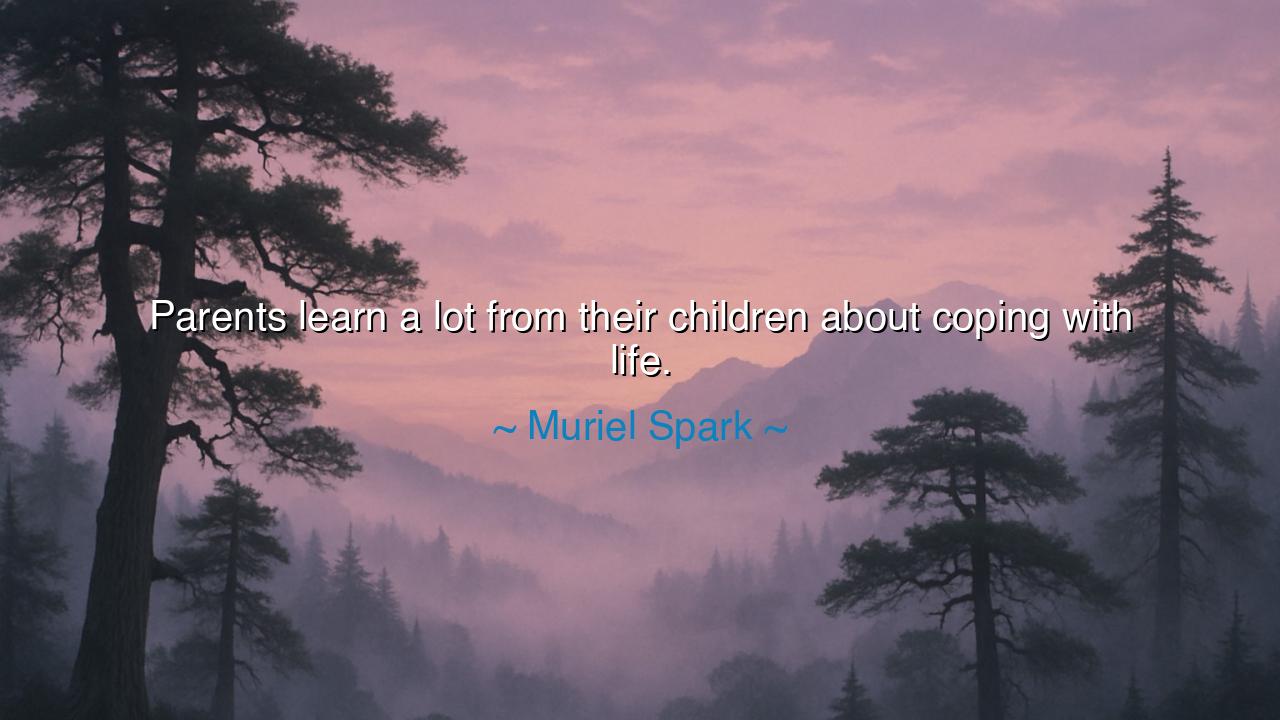
Parents learn a lot from their children about coping with life.






The words of Muriel Spark fall with the quiet force of truth: “Parents learn a lot from their children about coping with life.” At first, these words may seem reversed, for the world tells us that it is the parent who teaches, and the child who learns. Yet Spark reveals a hidden wisdom: that in the innocent resilience of children, in their unguarded honesty, in their way of meeting each moment freshly, there lies a school of life for even the most experienced of adults.
The ancients often spoke of children as vessels of purity and mirrors of the soul. They saw in them not weakness, but a strength uncluttered by cynicism. A child stumbles, falls, and rises again without brooding on failure. A child asks questions without shame, laughs without restraint, and loves without calculation. These are not merely childish traits—they are lessons in how to cope with life when its burdens grow heavy. Parents who pause long enough to see will discover that their children are not only students of their wisdom but teachers of resilience, wonder, and courage.
History itself offers examples of this paradox. Consider the story of Victor Hugo, who, while in exile, often wrote of how his daughter’s joy and curiosity sustained him. Banished from his homeland, stripped of power, he might have drowned in despair. Yet in the simple delight of his child—her laughter at the waves, her insistence on seeing beauty where he saw loss—he rediscovered hope. In this, we see Spark’s truth: parents are guided by their children, taught how to endure storms with lighter hearts.
The wisdom also calls us to humility. Too often, parents imagine themselves as fountains pouring endlessly into the empty vessels of their children. But Spark reminds us that life flows both ways. In the patience children demand, parents learn endurance. In their defiance, parents learn flexibility. In their vulnerability, parents learn tenderness. The parent who listens is not diminished but enlarged, for to accept wisdom from a child is to remember that truth is not bound by age.
There is also a lesson here about survival. Children cope with life not by avoiding its difficulties, but by transforming them. A toy breaks, and a child invents a new game. A friendship falters, and a child weeps today but seeks another companion tomorrow. In this lies a profound teaching: that loss and disappointment are not ends, but invitations to begin again. Adults who harden under the weight of suffering can learn from this resilience, carried so naturally by the young.
The lesson for us is clear: see your children not only as apprentices, but as fellow travelers whose eyes may glimpse what yours have forgotten. Learn from their joy, their curiosity, their ability to forgive quickly and move forward. Let them remind you that life is not only a burden to be carried, but a mystery to be explored. In doing so, you honor their role not only as your children, but as your teachers.
Practically, this means slowing down enough to notice. Watch how your child meets frustration. Watch how they find wonder in what you overlook. Instead of dismissing their play or questions as childish, ask yourself what lesson lies beneath. And when your own spirit grows weary, let their laughter, resilience, and unfiltered honesty rekindle your strength.
Thus, Muriel Spark’s words echo as timeless counsel: “Parents learn a lot from their children about coping with life.” To parent is not only to guide, but to be guided. It is to stand in a circle of learning that flows both ways. And in this circle, both generations grow stronger, wiser, and more human, carrying each other through the trials and triumphs of existence.






AAdministratorAdministrator
Welcome, honored guests. Please leave a comment, we will respond soon